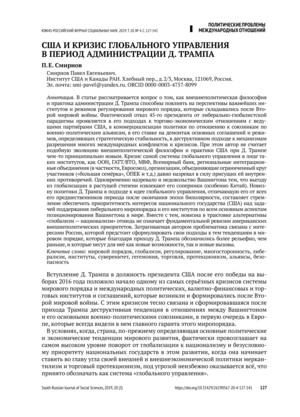Abstract
The article deals with the influence of Donald Trump’s foreign policy attitudes and practices on the institutions and arrangements of world order regulation which developed after World War II. The actual rejection of the liberal globalist paradigm by the 45th president is manifested in his approaches to trade and economic relations with leading US partners, in the commercialization of politics towards the US security allies, in subverting the key agreements and regimes underlying the strategic stability, in his destructive approach to mechanisms of resolution of some grave international conflicts. Yet the author does not consider those trends in the US foreign policy under the Trump presidency something fundamentally new. The crisis of the global governance system and its key institutions (the United Nations, GATT / WTO, IMF, the World Bank, regional integration associations, in particular the European Union, G7, OPEC, etc.) has long been brewing due to their inherent internal contradictions. Simultaneously, Washington’s discontent was growing over its key rivals (particularly China) increasingly benefiting from globalization. The novelty of Donald Trump’s attitudes towards globalism and multilateral institutions lies in his desire to ensure not selective, but all-embracing priority of the interests of the national state (the United States) over maintaining the liberal world order and its institutions. However, Trump’ radically new interpretation of the ‘globalism — nationalism’ dichotomy by no means presupposes any fundamental revision of the American foreign policy priorities. The issues raised by the author are closely connected with the interests of Russia, which has to formulate more clearly its approaches to modern trends in the world order. Those trends have become more prominent than earlier with Donald Trump’s advent, presenting both new opportunities and new challenges for Russia.
Keywords
References
Барановский, В.Г., Иванова, Н.И. (ред.). (2015).Глобальное управление: возможности и риски. Москва: Институт мировой экономики и международных отношений, Российская академия наук.
Будущее глобализации под угрозой? Доклад (под рук. Прокофьева И.В.). (2018). Проблемы национальной стратегии, 3 (48), 11–56.
Путин, В.В. Интервью газете The Financial Times (2019, июнь 27). Президент России. Режим доступа: http://kremlin.ru/events/president/news/60836
Abrams, E. (2019). Trump Versus the Government. Can America Get Its Story Straight? Foreign Affairs, 1 (98), 129–137.
Burns, W. (2019). The Back Channel. A Memoir of American Diplomacy and the Case for its Renewal. New York, Random House.
Clausing, K. (2019). The Progressive Case Against Protectionism. How Trade and Immigration Help American Workers. Foreign Affairs, 6 (98), 109–120.
Colgan, J. (2019). Three Visions of International Order. The Washington Quarterly, 2 (42), 85–98. DOI: 10.1080/0163660X.2019.1621657
Colgan, J., Keohane, R. (2017). The Liberal Order Is Rigged: Fix It Now or Watch It Wither. Foreign Affairs, 3 (96), 36–44.
Daalder, I.H., Lindsay, J.M. (2018). The Committee to Save the World Order. America’s Allies Must Step Up as America Steps Down. Foreign Affairs, 6 (97), 72–83.
Haass, R. America and the Great Abdication. (2018, December 28). The Atlantic. Retrieved from https://www.theatlantic.com/international/archive/2017/12/america-abidcation-trump-foreign-policy/549296/
Heneghan, M. Global Governance and multilateralism in an age of anti-globalists (2019, May 2). SPERI. Sheffield Political Economy Research Institute. Retrieved from speri.dept.shef.ac.uk/2019/05/02/global-governance-and-multilateralism-in-an-age-of-anti-globalists/
Morse, J.C., Keohane, R. Contested Multilateralism. (2014). Review of International Organizations, 4 (9), 385–412. DOI: 10.1007/s11558-014-9188-2
Posen B. (2018). The Rise of Illiberal Hegemony. Trump’s Surprising Grand Strategy. Foreign Affairs, 2 (97), 20–27.
President Obama: The TPP would let America, not China, lead the way on global trade (2016, May 2). The Washington Post, p.1.
Remarks by President Trump in Press Conference | Osaka, Japan (2019, June 29). The White House. Retrieved from https://www.whitehouse.gov/briefings-statements/remarks-president-trump-press-conference-osaka-japan/
Remarks by President Trump to the 73rd Session of the United Nations General Assembly | New York, NY (2018, September 25). The White House. Retrieved from https://www.whitehouse.gov/briefings-statements/remarks-president-trump‑73rd-session-united-nations-general-assembly-new-york-ny/
Remarks by President Trump to the 74th Session of the United Nations General Assembly | New York, NY (2019, September 25). The White House. Retrieved from https://www.whitehouse.gov/briefings-statements/remarks-president-trump‑74th-session-united-nations-general-assembly/
Schake, K. (2019) Back to Basics. How to Make Right What Trump Gets Wrong. Foreign Affairs, 3 (98), 36–45.
Stokes, D. (2018). Trump, American Hegemony and the Future of the Liberal International Order. International Affairs, 1 (94), 133–150. DOI: 10.1093/ia/iix238


